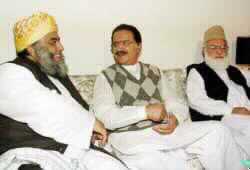HIGHLIGHTS: Decision Raises Doubts about Likelihood of Coalition Between Party of Former P.M. Bhutto & an Islamic Bloc Opposed to Musharraf|| PPP (Bhutto) & MMA (Fazal-ur-Rehman) Describe Decision as Being Undemocratic|| Delay Requested by Pro-military Pakistan Muslim League Quaid-e-Azam (PML-QA) Party with the Most Seats in Parliament But Not Enough Majority|| Pakistan's Markets Index Down Because of Political Uncertainty|| STORY: Pakistan's military government on Wednesday delayed the opening of parliament by a week, dealing a blow to a proposed coalition critical of the president and postponing the resumption of civilian rule.
The decision followed a cabinet meeting chaired by military ruler General Pervez Musharraf, who seized power in a bloodless coup three years ago and is accused by opponents of rigging the October 10 poll in his favor by banning key candidates.
The postponement raises doubts over the likelihood of a coalition between the anti-military party of former Prime Minister Benazir Bhutto and an Islamic bloc opposed to President Musharraf's support for the U.S.-led war on terror.
The parties had appeared close to a deal giving them a majority in the 342-seat National Assembly and making Fazal-ur-Rehman, a conservative leader in the religious coalition, prime minister.
Both Bhutto's Pakistan People's Party (PPP) and the Muttahida Majlis-e-Amal (MMA), of which Rehman is secretary-general, attacked the decision by the cabinet as undemocratic.
The move came after an appeal by the pro-military Pakistan Muslim League Quaid-e-Azam (PML-QA) party, which won the most seats in parliament but not enough to form a majority.
"The delay in the session is an attempt to create an artificial parliamentary majority for the PML-QA," Raza Rabbani, acting secretary-general of the PPP, told Reuters. "The session should be called so the process of transfer of power can begin."
But many members of the PPP would prefer to see Makhdoom Amin Faheem, a feudal landlord from the southern province of Sindh and Bhutto's deputy, as premier. The two groups have said they needed to hold more talks to resolve the issue and agree on a candidate.
Political commentators said a coalition fiercely critical of Musharraf and led by a religious leader opposed to the U.S. military in Pakistan could pose serious problems for the general, who enjoys sweeping powers including the right to dissolve parliament.
MARKETS SPOOKED
With the race for a coalition still on, Pakistan's main stock market index ended down 1.52 percent at 2,223.41 on Wednesday due to political uncertainty, after dropping four percent on Monday and staging a partial recovery on Tuesday.
"Investors are worried about the confusing political situation, especially given doubts about when the assembly will open," said Ashraf Zakaria, a broker at AHRL Securities.
The market also fell sharply in the immediate aftermath of the election when the MMA stunned Pakistan with huge gains, becoming the third largest force in politics.
Investors feared the rise of the anti-U.S. religious right could undermine relations between Islamabad and Washington, which relied heavily on Musharraf to pursue its campaign against the Taliban and al Qaeda in Pakistan and neighboring Afghanistan.
State PTV television reported that parliament, which was to have opened on Friday, would now convene in "about a week."
The general defended his democratic record after fierce criticism from political opponents and a European Union observer mission over his handling of the poll.
The popular Bhutto and another exiled former prime minister, Nawaz Sharif, were effectively barred from contesting the election, and Musharraf enhanced his powers and extended his rule by five years shortly before the ballot.
PHOTO CAPTION
Makdoom Amin Fahim (C), prime ministerial candidate of Pakistan People's Party, Fazal-ur-Rehman, (L) secretary general of the Muttahida Majlis-e-Amal (MMA) and Qazi Hussain Ahmed (R) parliamentary leader (MMA) during a meeting of anti-military Alliance for the Restoration of Democracy (ARD) in Islamabad November 5, 2002. REUTERS/Mian Khurs
- Author:
& News Agencies - Section:
WORLD HEADLINES


 Home
Home Discover Islam
Discover Islam Quran Recitations
Quran Recitations Lectures
Lectures
 Fatwa
Fatwa Articles
Articles Fiqh
Fiqh E-Books
E-Books Boys & Girls
Boys & Girls  Hajj Rulings
Hajj Rulings Hajj Fatwas
Hajj Fatwas














